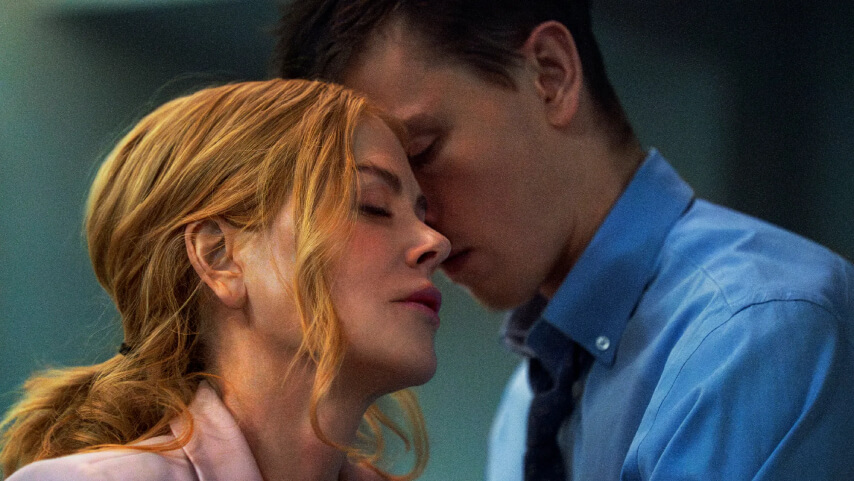A laptop sits at the edge of the frame, its glow casting shadows across Romy (Nicole Kidman). Porn is playing. There are glimpses of a woman on all fours, gazing behind her at a man who coaxes her on with sneering encouragement. But the images are less important than the tinny voice emanating from them. “Do you like this kind of sex?” the man asks. Emotions scramble across Romy’s face, looking for a perch. (Post-coital satisfaction? Disdain? Discomfort?) But it’s only for a split second before the title appears: Babygirl. This is a brief moment in writer-director Halina Reijn’s film but, then again, Babygirl is a film built atop throwaway suggestions and gestures. From Romy’s early masturbation scene, Reijn makes her intent clear: Babygirl urges its fans forward and taunts any sex scene skeptics who cross its path.
Babygirl charts the torrid affair between a CEO (Kidman) and her intern, Samuel (Harris Dickinson). Before Samuel is even introduced, Reijn carefully colors the nuances of Romy’s life in business-approved shades of gray and beige. Her high-rise apartment floats suspended above the New York skyline, her husband (Antonio Banderas) is understanding, her children are sweet if exasperating, her job manufacturing automation systems is carefully calibrated to succeed—it is a conveyor belt of coffees and meetings and packed lunches and familiar sex.
Her first encounter with Samuel is on the street, although cinematographer Jasper Wolf’s camera never actually rests on his face. Instead, his body is disassembled by Reijn; for a moment, he is all hands, shoulders tumbled forward, and murmurs of “good girl” as he holds a random dog back from charging at Romy. When the two finally have their first real conversation in the office break room, Romy gets to ask, “Hey, how did you get that dog to calm down?” He smirks, “I gave it a cookie.”
This is the pace of all their interactions, propulsive and strange and revealing, perpetually flirting (literally) with disaster. Once Romy is assigned to be Samuel’s supervisor, their interactions grow in frequency and the film hits a frantic, accelerated speed. Romy’s stoic reserve absorbs and reflects Samuel’s swaggering quips, but neither of them are exactly one thing, and their early foreplay conceals the tender dynamic of their actual relationship.
Reijn’s magic trick with Babygirl is her willingness to extend a huge amount of empathy to every character entangled in the affair. No one is culpable, instead they are allowed to discover how their desires extend past the pre-packaged containers of their lives. There is a radically charged focus to each of Romy and Samuel’s sexual encounters, with Kidman’s face—and the self-disgust, admittance, and revelation therein—held in unbroken closeups. The act happens blurrily or in the background, measured only in the relief that ripples across her features. No one is punished for these encounters, and Romy’s slippery process of sexual discovery is a way for her to re-engage with the potential of her relationships.
There are shades of Steven Shainberg’s Secretary in Babygirl, but by its finale, it ends up strangely reminiscent of Paul Mazursky’s revelatory Bob & Carol & Ted & Alice. In that film, Mazursky follows the four leads as they wander out of their hotel room following their (kind of) sexual escapades. They dreamily wander around Las Vegas, drifting back to their respective partners to gaze up at them lovingly before the screen fades to black. Both Reijn and Mazrusky seem determined to let their characters move authentically—free of any puritanical judgment.
In the end, it’s unclear who is the barking dog and who is being held back in the dynamic between Romy and Samuel—or whether the stakes were something different altogether. But Babygirl uses sex to make sense of such a push and pull, letting people’s instincts play out in small, ineffable gestures across the copious, careful love scenes. Reijn has crafted a feature-length homage to the early rush of attraction–one that the director knows can strike unprovoked, regardless of relationship status. Within the film’s 114-minute runtime, that ephemeral spark between Romy and Samuel is bottled, smashed, and left seeping across the screen, leaving an intriguing pattern in its wake.
Director: Halina Reijn
Writer: Halina Reijn
Starring: Nicole Kidman, Harris Dickinson, Antonio Banderas, Sophie Wilde, Esther McGregor, Vaughan Reilly
Release Date: December 25, 2024

 Keep scrolling for more great stories.
Keep scrolling for more great stories.
